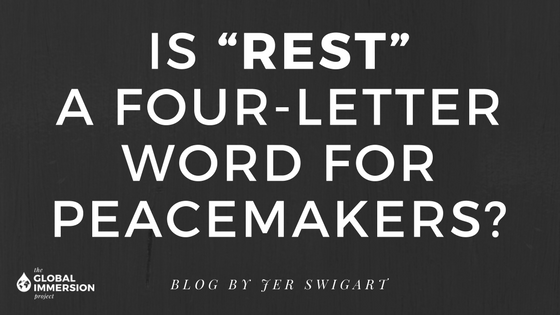Simply put…rest is hard. It’s hard to do. It’s hard to talk about. And, therefore, it’s one of the most important yet completely disregarded habits of Everyday Peacemaking.
During a recent training call with partners from our Embers Community, our friend and Mexican peacemaking colleague, Alejandra Ortiz reflected on the power of rest and its necessity for prolonged peacemaking practice.
She opened with this:
“We often imagine that peace requires our 24-7 investment. I wonder if this indicates that we take ourselves too seriously. Remember, God is the great peacemaker and we are simply collaborators. It’s God’s work and we get to be apart of it.”
Ale was uniquely positioned to reflect on the importance of rest with us as she and her husband Abdiel, both key peacemaking influencers in Tijuana amongst the migrant, refugee, and deportee communities, had just returned home from a year-long study sabbatical at Regent College in Vancouver, British Columbia. Throughout her year of rest, she came to some critical realizations:
- Rest is not something that we deserve. It’s God’s grace. Like all things grace, we must learn to receive the gift.
- Rest is a fertile space to grow in our trust of God for it is there that we encounter that God doesn’t need us.
- Rest is deeply connected to our identity and sense of calling. It is in the moments of rest that we discover again whose we are, who we are, and what is ours to do.
- Rest often involves silence and solitude and must also include friends, food, play, stories, intimacy, and laughter.
- Rest is the only thing that allows the waters of our lives to calm and the sediment of our lives to settle. It is then that we see more clearly who we’ve become, what’s distracted us, and what lies directly in front of us.
- Rest is the practice that opens our complete selves up to God and to the work that God wants us to do.
By call’s end, we all found ourselves appropriately convicted of our need to prioritize rest and inspired to take a next step toward it. My personal action was to learn from my wife, Jaci, what my indicators are that I’m fatiguing. I like to think that I know when I’m tired, but I rightly assumed that she has become an expert of reading my indicators.
What I do know about myself is that when fatigue sets in, I critique myself for not having a larger engine and, rather than stepping back to refuel, I step on the accelerator. My acceleration through fatigue has everything to do with proving something to myself and usually results in poor decisions, an unhappy family, and deeper fatigue.
Learning of our fatigue indicators from someone who knows us well seems critical if we intend to spend our lives walking the peacemaking journey. So I got curious with Jaci and here’s what I learned about my fatigue indicators:
- Dark circles form under my eyes.
- I become less playful with my kids and more serious with Jaci.
- I become more cynical, critical, and non-helpfully opinionated.
- I waste more time on social media.
As we reflected further, she helped me understand that it’s not my fatigue that irritates her, but that it’s my choice to accelerate rather than rest in the moments I need it that does. Her frustration lies in the fact that when I need it most, I refuse to care for myself through rest and she and my family experience the negative impact of it. That realization led us into a completely different, necessary, and restorative conversation about how my misunderstanding of her frustration has contributed to my ongoing acceleration. Isn’t it amazing how a little curiosity catalyzes restoration that we didn’t anticipate?
Returning to the practicalities of rest, we concluded that, when she observes my indicators of fatigue, the best possible actions are the following:
- A cup of tea with some curiosity. As soon as possible, we’ll spend some time together over a beverage that encourages us to slow down and look one another in the eyes to acknowledge the fatigue and unpack the good, bad, and ugly of how I got there.
- Go to bed. There’s always more to do, but often, the most worshipful, impactful practice is to simply shut it all down and get a good night’s rest.
- Stop with the incessant social media. As a peacemaking practitioner, I tend to give into the myth that if I don’t stay on top of the current events, I’ll be out of the loop, or ineffective, or ill-equipped to respond. The truth is that when I’m fatigued, social media does nothing but feed my cynicism. I need to put it down.
- Play. The work is always intense and usually demands our focused and very best energy. Play re-creates us. In the midst of fatigue, I need to simply allow myself to play in the ways that bring me back to life.
Friends, as we seek to integrate rest into the habit of our lives, I want to you encourage you to replicate my conversation with Jaci. Invite someone who knows you well to grow your awareness of your fatigue indicators (What are signs that I’m fatigued?) and help you understand what the experiences are that renew your heart, soul, mind, and body. For, we need each other to rest!
Author: Jer Swigart – Cofounding Director of Global Immersion Project

